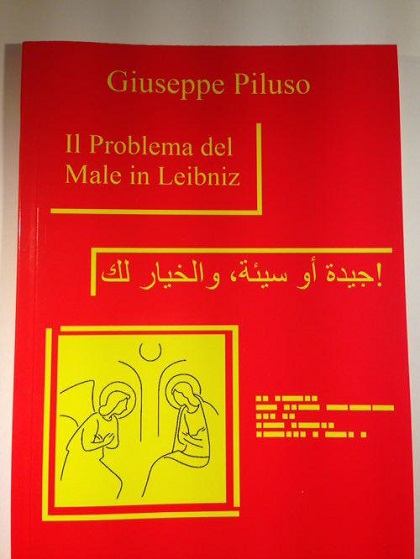They wrote about me… (2015 – 2017)
Book Title: “THE PROBLEM OF EVIL IN LEIBNIZ”
It is commonly known that the love of knowledge is wonder and research; it arises spontaneously only in those who dare, questioning and falsifying any certainty. This is the case of Giuseppe Piluso, a “natural philosopher” from Cosenza who discovered his inclination towards speculation and problematisation outside the school environments in which he was formed. His intimate and innate inclination towards philosophical meditation seems, in fact, to contrast with his studies and his technical- scientific education achieved first at the Commercial Institute and then with the enrolment at the Faculty of Physics, abandoned after only three exams. In 2007 – 2008, he enrolled at the Faculty of Philosophy and realized his true aptitude and passion culminating in his academic path, with the thesis that we propose here “THE PROBLEM OF EVIL IN LEIBNIZ”. This enlightened work is marked by fluency, expertise, competence, a complexity and a mastery of a specific language and articulation of issues that can include him among the best essayists. In this livre d’essai, specialized and of great argumentative depth, emerges clearly a key reflection of human existence: “If God exists why has he allowed evil and, if God does not exist, where does the good come from?” Giuseppe Piluso faces the quaestio, the “mystery” through the impeccable analysis of the Theodicea of Leibniz, that never as today, looks modern: on the one hand the truth of faith and on the other hand the appearance of evil. The typical themes of God’s justification, the freedom of man and the origin of evil are dealt with according to the following Leibniz’s vision: the rationalization of his entire system and the irenicism of natural religion. “The problem of evil has a special place, probably representing in itself, the question of the moral sense of man’s life. “If God had wanted the” perfect world “he should have duplicated himself and this would have made no sense. But “among the possible worlds” he chose the least worst ( “conditionality of the divine will”) through which the man, proceeding from the metaphysical evil to the moral and physical ones, through reason, instrument and means of God, goes beyond the imperfection, the pain, the suffering, the mistakes, to obtain “an incomparably greater good than the evil that comes from it.” God has created, through the principle of sufficient reason, free men and fully responsible for their own choices with the consequent possibility of choosing their conduct.” Just as the current is the cause of the movement of the boat, but not of its slowdown, God is the cause of perfection in the nature and actions of the creature, but the limitation of receptivity of the creature is the cause of the defects that are found in his action.” This is the concept of ” divine incompossibility”, as Piluso reminds us: the anthropo-ontological discourse includes the essence and the human existence. As essence it cannot be different from what it is and as existence it can be changeable and contingent. “Thus, you will have a necessity of essences and a contingency of the existing ones and God will also know a priori the contingent.” The wise image of God as “watchmaker” of a pre-established harmony between the various apparent solitudes of monads, but all synchronized towards a universal communication, has the task of avoiding the incommunicability and the related misunderstandings, closures, barriers. ” A concept of order thus formulated, as it emerges from the Theodicy, excludes all rigidity and necessity and includes the possibility of freedom in the sense of choosing among various possible orders.” The aim of Leibniz’s ontological metaphysics was to achieve a universal peace built on knowledge, on the recognition of reason as the only strong and powerful guide (even though linked to human imperfection) towards the liberation of evil from irrationality. God allows evil, therefore, but he is not responsible for it since it is in the problematic human reason that is carried out the solution “to recognize as a rule of reason, not the geometrical necessity but a moral obligation.” Therefore the prophetic and contemporary design requirements that the philosopher Leibniz proposed, such as eg. a universal language and encyclopedia, refer to a vision of a “globalized humanity” under the reconciliation achieved through knowledge (what Kant defines “Categorical Imperative”) and the sense of belonging to the common good. ” For many and good reasons there is therefore, the belief that the religious ecumenism and the moral activism of Leibniz derive from an attitude to listen to the other, from the awareness that men, to be happy, must come to a rational recognition of a common belonging to the universal divine kingdom. “So, thanks to Giuseppe Piluso for having given us the figure of a Leibniz contemporary and contextualized in an optimistic view of human action designed as a” hypothesis “of an ethical choice among many possible options of a liquid life, as Z. Bauman would say. The Redemption depends, therefore, on a free and conscious will and not established by an absolute necessity, that belongs only to the eternal Truth. A sort of “religion of humanity” which, conscious of the inevitability of suffering and pain inherent to its essence / existence, becomes aware of the intimate strength possessed and consisting in the ability to be able and to know how to achieve a lasting peace through the full and final escape from the individual and selfish isolation, in order to discover the “pre-established harmony” which makes evident and clear the relationship between the parts and the whole.
Maria Sergio



